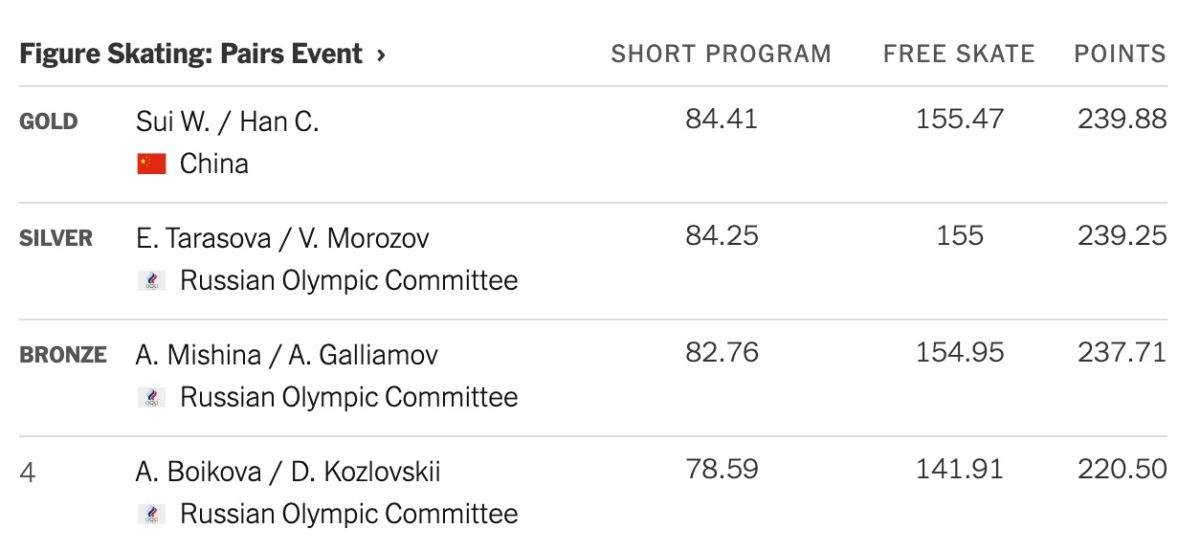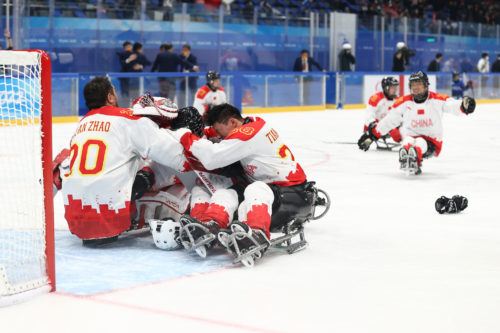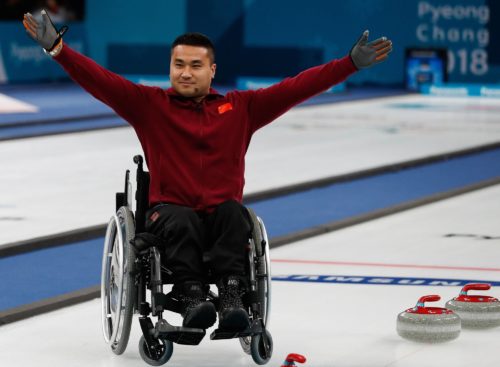Han Cong and Sui Wenjing triumph as Beijing 2022 concludes
In the final Olympic edition of the China Sports Insider Podcast, the hosts talk about China surpassing all expectations at these Games, an example of what not to do at an international press conference, and just how common it is for penises to freeze in cross-country skiing. (Apparently more common than you think.)

Four years after losing by 0.43 points, figure skating duo of Hán Cōng 韩聪 and Suí Wénjìng 隋文静 broke through on home turf, winning pairs figure skating gold by 0.63 points on Saturday. It’s just one of the many stories of athletic triumph — Rèn Ziwēi 任子威, Sū Yìmíng 苏翊鸣, Xú Mèngtáo’s 徐梦桃, and Qí Guǎngpú 齐广璞, among others, are now all household names in China, if they weren’t before — from the recently concluded Beijing Olympics, and it’s the lead story in the final Olympic edition of the China Sports Insider Podcast.

Hosts Haig Balian and Mark Dreyer also talk about Eileen Gu (谷爱凌 Gǔ Àilíng) drawing a bit of criticism for mumbling through the Chinese national anthem (3:10), the curious case of a skier’s frozen genitals (7:53), and China’s choice of closing ceremony flagbearer (11:24) — as correctly predicted by Mark:
As predicted 😉 Xu Mengtao will be China's flagbearer at tonight's closing ceremony. She will be alongside Gao Tingyu – who also carried the flag at the opening ceremony. Thought maybe they'd share the love a little bit more?! https://t.co/y8euJFgcsp
— Mark Dreyer (@DreyerChina) February 20, 2022
Alas, Xu Mengtao was just one of the closing ceremony flagbearers, the other being Gāo Tíngyǔ 高亭宇 — who was also the opening ceremony torchbearer (along with Dinigeer Yilamujiang).
Read the partial transcript of the episode below, or listen to the full episode:
Mark Dreyer: It’s been a whirlwind. I mean, it always is. It’s gone quickly, hasn’t it? I’m not gonna lie, there’s still that Sunday evening feeling of getting the blues again. You know, I’ve been here before, and I’m gonna miss it.
Haig Balian: I’m gonna miss watching the sports. It’s been a lot of highs and a lot of lows. And one of the lows, obviously, this week was the woman’s final for the figure skating. Oh, man.
Mark Dreyer: I mean, yeah, the high of her short program, and then the lowest of lows in the in the free skating. And if people didn’t see it, everyone expected [Kamila Valieva] to clean up, she was walking away with gold, and there was going to be an ROC podium sweep, which would have basically triggered the world beyond comprehension at the outrage of the injustice. And then, she stumbled.
And again, as with many of these stories, there are different levels, people saying, Well, you know, she’s only 15, is it her fault? Should she have been there in the first place? And who’s to blame? And then of course, the focus on the coach, the supervillain coach, Eteri [Tutberidze].
Haig Balian: Yeah, exactly. What a caricature of the evil coach.
If I could just turn this to me for a second. So you might recall that at the beginning of the Games, we may have had an opportunity to go to a couple of events. This was actually one of the events that I put in for, and as I was watching, I was like, was it a good thing that I didn’t actually end up going or a bad thing? Because, wow, that was uncomfortable watching. It was tough to watch.
There were so many highs as well, and one of those highs is China continuing to rack up gold. Just yesterday, figure skaters Sui Wenjing and Han Cong from Harbin won figure skating gold, and that was amazing.
Mark Dreyer: It was another fantastic story, because four years ago in Pyeongchang, they were leading after the first program and then made mistakes in their second half and had to settle for silver. This time, they were absolutely stunning. I’m far from a figure skating expert, but it was like, Wow, that was good. And it was close though, super, super tight. A couple of ROC couples were just within a couple of points, all within a couple of points for gold.
They won a ninth gold for China, unprecedented, way beyond expectations. People who were saying they were expecting nine goals for China, they were either crazy or they were unrealistic. But it’s been a fantastic performance beyond their wildest hopes, I think.
Haig Balian: Eileen Gu won her second gold medal in the freeski halfpipe just a few days ago. You talked about how the conversation around Eileen Gu had subtly been shifting in China. And that shift has become a little more noticeable in the last few days. The Wall Street Journal had a piece on this a couple of days ago. And one of the things that I found interesting, as you’ve been pointing out, some of the privileges that Gu seems to have had in the Olympics that maybe other athletes from China haven’t.
Mark Dreyer: The contrast — and Chinese friends have have pointed this out to me as well — like, she has her mother and her grandmother in the mixed loop, for one thing. She was posing with her grandma and it was a great picture, but I was thinking, Well, how is she part of Team China’s delegation, how many other athletes get that? There’s obviously benefits that she’s got with the whole citizenship/passport thing, we’ve discussed that before. She was able to wear her hat of choice on the podium, the panda hat, and everyone was loving that, but it’s usual that you have to wear the team uniform — all the other freestyle athletes had the Team China hats on the podium, where she had her red fashion hat the first time and then the panda hat.
There was another thing that people have been pointing out, and this is I think a small thing, but it kind of gets to the crux of the difficulties of being Eileen Gu and trying to navigate that divide. She faced a little bit of criticism for not really singing the Chinese national anthem for the first gold. And so she kind of mumbled her way through a little bit more, moved her lips a little bit more for the second time. Now, she obviously speaks very good Chinese, and I don’t imagine it would be hard for her to learn the anthem to some reasonable level, but she’s probably thinking, I’ve got to sing it enough that people don’t criticize me for not singing, but if I’m standing on the podium and loudly belting out the Chinese national anthem, that’s not going to be a great look back in the U.S. And she’s not wrong there, she’s not wrong. But again, this is the sort of the impossible situation she faces.
Haig Balian: It’s such a tightwire that she’s walking, it’s amazing. So that’s two golds for her and a silver, super successful for her.
We almost got to the end of this Olympics without —
Mark Dreyer: Almost.
Haig Balian: — almost got to the end of it without this political, I don’t know, stumble, own goal. What happened, Mark?
Mark Dreyer: Ahead of the Games, I was looking at three things [to gauge] success for China: COVID — big green tick for that one — performance in the metal tables — again, big green tick — and then avoiding some sort of political scandal.
You know, realistically, I was expecting at least a handful of athletes to speak out or for there to be some awkward press conferences, and it was managed so that didn’t really happen. We had a couple of athletes speak out against China, but only once they got back home, away from Beijing, so it doesn’t really make any headlines.
There was a final press conference this week where the IOC spokesman Mark Adams was asked a couple of questions about Taiwan and the Chinese Taipei delegation, and also another one about the IOC uniforms made by Chinese sportswear manufacturer Anta and whether they were made from Xinjiang, and he gave classically bland diplomatic answers, doing exactly his job of giving the journalists nothing really to work with.
Haig Balian: He’s a graduate of IOC University.
Mark Dreyer: There you go. Now, he answered the questions. He sort of said, I don’t really know about this, or he kind of said, on the uniforms, There’s no forced labor, we’ve looked into this. And then it was done. Three times, the female Chinese official from the Organizing Committee interrupted him or basically spoke over him. She could not let it lie. She’s like, I’m sorry, I need to answer this. And then she talked about One China on the Taiwan thing, and she talked about the Xinjiang narrative three times, and it was just a massive own goal, because she didn’t need to say anything, and it wouldn’t have been a story. But the fact that she did not once, not twice, but three times — suddenly there was a global story.
There was one guy who said, in 30 years of covering the Olympics, he’s never seen anything like it. Now, maybe that’s an exaggeration, but that’s his view and he’s entitled to it. So I understand why she felt these are red lines, you can’t cross these lines, and I can’t let it pass. But from a communications point of view, like, stop giving yourself a black eye when you’ve almost got to the end of the Games and you get a third green tick from the Mark scorecard. Now it’s only two and a half.
Haig Balian: So close, so close.
Speaking of a ballsy reaction, let’s move over to Zhangjiakou, which has been in a deep freeze. So deep, in fact, that a poor Finnish athlete had a really — how should I say it? — um…
Mark Dreyer: Let’s not mince words, he had a frozen penis.
Haig Balian: Yeah, he had a frozen penis.
Mark Dreyer: This is actually a true story. He’s the only one who’s spoken about it. So what happened is that we had the 50-kilometer men’s cross country race scheduled for Saturday, and there were high winds and cold temperatures. And so with around an hour to go, they decided to cut it to just 28 km and move it one hour later.
Now, a lot of the athletes were quite upset about this because you prepared for 50 km, right? You train 50 km and suddenly you’re doing 28? Some of the competitors were upset with the FIS, the governing body. The IBU, which governs biathlon, had been reading the same weather forecasts and they had rearranged their events with more than a day’s notice. So some issues there with the organization.
But I was speaking to one of the cross country coaches, and he was saying that it can get really, really cold, and he goes, Normally the core is fine, but it’s just the extremities, and he said fingers and toes. And he said genitals.
I was like, “What?”
He was like, “Yeah, oh, one of the most painful experiences in my life.”
This was yesterday. And then the next day he sent me this link from Finnish media about his poor Finnish scare. In the race, he literally said I had a frozen penis, it was the most painful experience of my life.
So this is real, folks. If you want to get into cross country…basically don’t. Or wear some thermal underwear. Like, if this is a known thing, surely you can dress around the problem.
Haig Balian: I would do whatever it takes. You know, this sounds so painful.
We have also talked about how cold it gets up in Zhangjiakou before, I mean, it’s so, so cold when the wind is ripping. And I saw pictures of athletes yesterday, their faces were just completely white and there was frost coming out of there, it looked miserable.
~
Also, don’t miss Mark and Haig’s conversation with Team China ice hockey goalie Kim Newell (12:40), who spoke to the hosts from her hometown of Vancouver. A Princeton graduate, Newell learned Chinese so that she could converse with her grandfather and connect with her heritage. She made a few headlines last week when an aide told assembled media at a press conference that she wasn’t allowed to answer in English. Newell addresses that controversy at the 27-minute mark. Near the end (35:41), she gives her thoughts on China’s strategy of using naturalized and heritage players at these Games.
Click through for show notes from the most recent episode of the China Sports Insider Podcast. More Beijing 2022 coverage is here.





